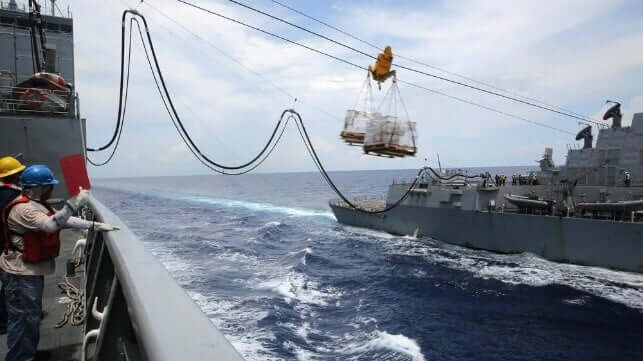
If you missed the announcement, you’re not alone. In a rapidly evolving maritime landscape, staying updated can be a challenge. That’s why we’re here to break down what Secretary of the Navy Carlos Del Toro’s recent initiative means for the Military Sealift Command (MSC) and why it matters.
Backstory: A Growing Crisis in Maritime Logistics
The Military Sealift Command is the logistical backbone of the U.S. Navy, managing 140 logistics ships and employing approximately 7,000 civil service mariners. Over the years, the command has taken on expanded responsibilities, supporting the Navy’s global operations amid increased demand. However, like much of the U.S. Merchant Marine, MSC has been grappling with severe recruitment and retention challenges. These workforce shortages have strained operations, forcing mariners to work overtime and delaying critical maintenance schedules.
This situation has been compounded by a broader decline in the U.S. maritime industrial base. The shipbuilding and repair sectors, critical to sustaining the Navy’s fleet, face their own workforce shortages. For example, the maritime industry near Newport News, Virginia, is currently short 10,000 workers, with projections indicating a potential deficit of 40,000 by 2030.
Current News: Navy Takes 17 Ships Offline
In a move aimed at addressing these challenges, the Navy announced plans to sideline 17 ships over the next two years to give mariners a much-needed break and focus on maintenance. Rear Adm. Philip Sobeck, Commander of MSC, explained that the initiative seeks to rebuild trust with mariners, improve work-life balance, and restore fleet readiness.
Taking these ships offline will free up about 800 mariners who will be reassigned to higher-priority vessels, such as fleet replenishment oilers, dry cargo/ammunition ships, and expeditionary sea bases. While this strategy aims to stabilize the workforce and maximize operational capability, it leaves significant gaps in logistics support—particularly for the Marine Corps, which relies heavily on these ships for troop movement and supply.
Marine Corps officials have voiced concerns that the sidelining of ships could exacerbate existing challenges. These include the inability to rapidly deploy forces during crises, as seen during the earthquake response in Turkey and evacuations in Sudan. Without sufficient logistical support, the Marines’ ability to train and execute their “MEU 3.0” deployment strategy is at risk.
Analysis: An American Problem
This is more than just a Navy or Marine Corps issue; it’s an American problem. The readiness of our military hinges on the strength of its logistics and industrial base. The current crisis highlights the consequences of years of neglect in workforce development, infrastructure investment, and public engagement with maritime issues.
The Navy’s initiative to sideline ships is a necessary step to address immediate workforce challenges, but it’s not a long-term solution. The U.S. must invest in rebuilding its maritime industrial base, creating pipelines to train and certify new workers, and offering competitive pay and career opportunities to attract talent. Additionally, public awareness and support are critical. Americans need to understand that the strength of our Navy and Marine Corps directly impacts national security and global stability.
As Rear Adm. Sobeck noted, “Rebuilding that relationship [with mariners] is the winning solution.” But this effort requires a broader commitment from industry, government, and the American people. It’s time to get off the couch and engage with the challenges facing our maritime forces. Supporting initiatives like career fairs and workforce training programs is just the start. We must demand accountability and action to ensure the sustainability of our naval capabilities.
Call to Action
Americans for a Stronger Navy urges you to stay informed and advocate for policies that strengthen our maritime forces. Whether through supporting workforce initiatives, raising awareness, or holding leaders accountable, your voice matters. Join the conversation on StrongerNavy.org and help chart a course toward a stronger, more resilient Navy.

